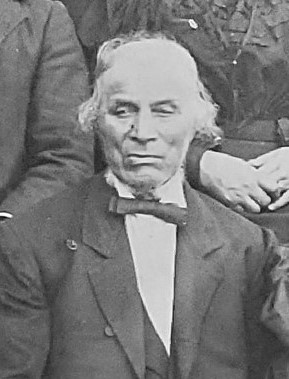Basil Biggs
Basil Biggs (1819 – October 6, 1906) was an African American laborer, veterinarian, and grave digger who played a significant role in the aftermath of the Battle of Gettysburg during the American Civil War. Biggs was born into slavery in Maryland but gained his freedom and moved to Pennsylvania, where he became a respected member of the Gettysburg community.
Early Life[edit | edit source]
Basil Biggs was born in Maryland in 1819. Little is known about his early life, including the exact circumstances of his emancipation. However, by the 1850s, he had moved to Pennsylvania, a free state, where he began to build a new life for himself and his family.
Life in Gettysburg[edit | edit source]
In Gettysburg, Biggs worked as a laborer and veterinarian, utilizing his skills to serve the community. He owned a small farm on the outskirts of the town, which would later become a significant site during the Battle of Gettysburg in 1863.
The Battle of Gettysburg[edit | edit source]
During the Battle of Gettysburg, one of the pivotal conflicts of the Civil War, Biggs's farm found itself in the midst of the fighting. Following the battle, which resulted in a significant Union victory but also left thousands of soldiers dead, Biggs played a crucial role in the burial and reburial efforts.
Post-Battle Efforts[edit | edit source]
In the aftermath of the battle, the Union government initiated a project to properly bury the Union soldiers in what would become the Gettysburg National Cemetery. Basil Biggs was contracted to lead a team of laborers in this monumental task. Over several months, Biggs and his team exhumed the bodies of soldiers who had been hastily buried in shallow graves across the battlefield and reinterred them in the newly established cemetery. This work was not only physically demanding but also emotionally taxing, given the scale of death and the condition of the bodies.
Later Life[edit | edit source]
After the war, Biggs continued to live in Gettysburg, where he resumed his work as a veterinarian and farmer. He remained an active member of the community until his death on October 6, 1906. Biggs's contributions to the Gettysburg community and his role in the aftermath of the battle have been recognized in recent years, highlighting his importance in American history, particularly in the context of African American contributions to the Civil War and its legacy.
Legacy[edit | edit source]
Basil Biggs's legacy is a testament to the significant yet often overlooked contributions of African Americans during the Civil War. His work in the reburial of Union soldiers at Gettysburg is a poignant reminder of the human cost of the conflict and the efforts to honor those who fought and died. Today, Biggs is remembered as a key figure in the history of Gettysburg and the broader narrative of the Civil War.
Navigation: Wellness - Encyclopedia - Health topics - Disease Index - Drugs - World Directory - Gray's Anatomy - Keto diet - Recipes
Search WikiMD
Ad.Tired of being Overweight? Try W8MD's physician weight loss program.
Semaglutide (Ozempic / Wegovy and Tirzepatide (Mounjaro / Zepbound) available.
Advertise on WikiMD
WikiMD is not a substitute for professional medical advice. See full disclaimer.
Credits:Most images are courtesy of Wikimedia commons, and templates Wikipedia, licensed under CC BY SA or similar.Contributors: Prab R. Tumpati, MD

